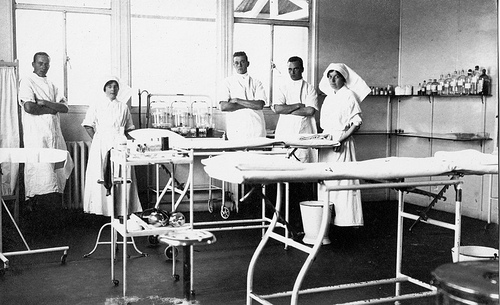Miss Thrifty11 August 29, 2013
 I’m just going to come out and say it: diabetes is a horrible, HORRIBLE disease. It amazes me that even now, in 2013, when an estimated 10 in every 100 Britons aged 60+ have type 2 diabetes, there remains a general lack of awareness about the condition.
I’m just going to come out and say it: diabetes is a horrible, HORRIBLE disease. It amazes me that even now, in 2013, when an estimated 10 in every 100 Britons aged 60+ have type 2 diabetes, there remains a general lack of awareness about the condition.
It doesn’t help that type 2 diabetes, which is the later-onset type (as opposed to type 1 diabetes, which cannot be prevented or postponed), has something of a stigma attached to it. It is viewed as being largely preventable, and the result of poor lifestyle decisions.
There is some truth in this, but there are also risk factors outside anyone’s control: for example, it has been calculated that up to one in five cases of type 2 diabetes can be linked to a variant gene passed down through families. Ethnicity also plays a part.
If you are a regular reader, you will have noticed that over these past few weeks I haven’t been about as much as usual. I have been spending no small amount of time in the South East where my dad, who was diagnosed with type 2 diabetes nine years ago, has been very poorly. He has been in hospital in London, benefiting from the very best of our NHS and recovering from operations to his legs. He has had a toe lopped off, too, but that is ok: at one point we thought he was going to lose more than that.
A lot of people seem to think that diabetes is all about insulin injections, diabetic comas and Theresa May losing loads of weight, but this barely pricks the surface. Insulin moves glucose from your blood into your cells, which convert the glucose into energy.
Type 2 diabetics are unable to produce or use insulin effectively, so without treatment the glucose stays in the blood and travels around your body, going to town on your blood vessels, nerves and organs. It increases your risk of heart disease, stroke, impaired vision, blindness and kidney problems, and reduces your life expectancy by an average of 10 years. Every year the NHS spends more than £250 million amputating diabetes-ravaged feet. That’s a lot of feet…
I have wavered about whether or not to publish this post. After all, it isn’t strictly about saving money in the way that a post about sale bargains, or a post about homemade bog cleaner is. Also, it’s a long’un. But I think that at its heart, this blog is all about lifestyle design: being able to enjoy life, even with limited means. Spending wisely. Taking pleasure from the simpler things. And something that sitting around in hospital wards over the past few weeks (and years) has taught me is that good health shouldn’t be taken for granted. It is priceless. I shan’t elaborate: I am sure there are plenty of you who know exactly what I mean.
The good news is that many of the risk factors for type 2 diabetes can be reduced or even erased. So if you don’t want to become part of this health epidemic, let’s begin here, with the obvious ones:
Lose Weight & Exercise Regularly

Being overweight or obese can, over time, cause the cells that produce insulin to fail. More than 85 per cent of people with type 2 diabetes are overweight or obese. It is never too late to lose weight and turn this process around. Fat around the middle is considered the most “dangerous” fat of all, because it is in and around abdominal organs such as the liver, and can make you less responsive to insulin. In one study, more than half of men with type 2 diabetes had a waist measurement of 40 inches or more.
Measure your waist: there are guidelines in place. Women should aim for a measurement below 80 cm (31.5 inches), European men below 94 cm (37 inches), and South Asian men below 90 cm (35.5 inches. South Asian men get the short end of the stick because they are more prone to type 2 diabetes). If necessary, use a healthy eating and exercise programme to lose weight.
Throw Away Your Cigarettes

Did you know that smoking can increase your risk of developing type 2 diabetes? A 2006 study tracked more than 4,500 smokers, former smokers and “never” smokers over a 15-year period, with remarkable results. One in five of the smokers developed diabetes or glucose intolerance, compared to just one in 10 of the “never” smokers. Many smokers also indulge in other high-risk habits, so the reasons for this link are not yet clear.
Again, it’s never too late to make a change for the better: the researchers also found that former smokers were less likely to develop diabetes or glucose intolerance. A second study has concluded that light smokers have a lower risk of diabetes than heavy smokers. If you are looking for another good reason to cut down or – even better – give up, this is it.
Look After Your Mouth

Gum disease isn’t just bad for your teeth. It allows bacteria to enter the bloodstream, which can lead to diabetes. When the body’s immune cells detect the bacteria, they respond by releasing proteins called cytokines, which help the body to produce infection-fighting chemicals. However, high levels of cytokines can also damage the pancreas and reduce its ability to produce insulin. The result: type 2 diabetes, even in people who are otherwise healthy.
Good dental habits can prevent or contain gum disease. Visit your dentist regularly. Brush your teeth twice a day. Don’t forget to floss.
Eat Plenty of Fibre

You can reduce your risk of developing type 2 diabetes and boost efforts to lose weight by putting fibre on your plate. It makes you feel full and aids digestion by slowing the absorption of carbohydrates into your blood, which keeps insulin levels steady.
Fruits and vegetables are high-fibre foods. Nuts, seeds, brown rice, beans and wholemeal bread are also fibre-rich.
Relax!

A 2008 study of more than 2,000 middle-aged and elderly men showed that the risk of developing type 2 diabetes was more than twice as high amongst those who had experienced high levels of anxiety, insomnia, depression, apathy or fatigue over a period of eight of more years. Professor Anders Ekbom, who led the study, said: “The link could be a result of the way psychological distress affects the brain’s role in regulating hormones.”
The increased risk appears to apply to men only. When the same researchers looked at more than 3,000 women, they were unable to detect a link between stress and diabetes.
Sweet Dreams

An estimated 40 per cent of diabetics suffer from obstructive sleep apnoea, a condition that interrupts your breathing when you are asleep. It is also thought that the condition may contribute to the development of type 2 diabetes. A number of studies have identified snoring, an inability to fall asleep and an inability to sleep for more than five hours a night as additional risk factors. It’s another reason to lose weight: two-thirds of sleep apnoea sufferers are also overweight or obese.
The Sleep Apnoea Association’s website (www.britishsnoring.co.uk) features tests to identify the causes of snoring and recommends most appropriate treatments. Follow a consistent, relaxing bedtime routine – and remember to avoid caffeinated drinks, large meals and rigorous exercise before bedtime. If any sleeping difficulties persist, consult your GP.
Monitor Your Blood Pressure

In 2007 an American study found that regardless of their weight, women with high blood pressure are up to three times more likely to develop type 2 diabetes. The researchers suggested that disruption to the cells that line the inner surfaces of blood vessels could be a precursor of both conditions. In the UK, blood pressure is defined as high if it is more than 140/85.
Equipment for monitoring your blood pressure at home is available from Boots and other large chemists, but your GP will do it for free. They may also prescribe medications such as statins. Exercise and low-fat, low-salt diets can also help to reduce blood pressure.
Avoid Excessive Drinking

Up to 70 per cent of alcoholics with liver disease are also diabetic, because alcohol can severely disrupt the body’s ability to regulate blood sugar levels. Even if you are not alcoholic, a heavy drinking habit can result in chronic pancreatitis, which impairs that organ’s ability to produce insulin. Over time, type 2 diabetes can result.
If you drink, keep within the recommended limits: 21 units a week for men, and 14 units a week for women. Never skip meals when you drink, as this further disrupts blood sugar levels. For those who enjoy unwinding with a glass, however, the good news is that consuming alcohol in moderate amounts – one drink a day for women and two drinks a day for men – has actually been shown to reduce the risk of developing type 2 diabetes. Researchers believe that any kind of alcohol “works”.
Learn to Recognise the Early Warning Signs

“The problem”, a diabetes nurse said to me once, “is that all too often, the early warning signs of type 2 are ignored or misunderstood because they seem trivial on their own, and because many people don’t know what to look out for.” If type 2 diabetes hasn’t been identified, it can’t be treated. If it isn’t treated, it only develops and gets worse. ”
Early warning signs of type 2 diabetes include feeling thirsty and hungry all the time, needing to use the bathroom more often, losing weight for no apparent reason and feeling frequently tired and irritable. If you experience any of these, do not hesitate to visit your GP. Tests are simple – and if you catch it early enough, you may be able to reverse the condition in its tracks.
Of course, one health benefit leads to another: follow the advice given above and you will end up looking as good as you feel! 🙂
Image credits: Dave Makes (bottle); HistoryInPhotos (exercising); jilly999 (smoking); Drake Goodman (drinking); AV Dezign (Rubifoam); Seattle Municipal Archives (fruit market); Charles Roffey (teatime); twigged1 (nurses); Zorin Denu (sleep); Richard (war room).
11 Responses to “How to reduce your risk of type 2 diabetes”
Annabel says:
After spending a week doing work experience at a amputee rehabilitation ward, I whole heartedly agree with your post. I have seen first hand the effects of diabetes on the legs. Amputation is obviously not the common occurrence if diabetes is well maintained, but it is a very serious risk factor which needs to be considered.
August 30, 2013 at 8:31 am
Helen says:
Really great post. Well done! 🙂
August 30, 2013 at 10:55 am
Sophie says:
What a great piece!
August 30, 2013 at 3:59 pm
Katie says:
Thank you for such a great, informative post! My cousin actually died due to undiagnosed diabetes in his 20s – such a tragic death, and so avoidable. I have known ever since how potentially dangerous diabetes can be, and try to maintain a healthy, active lifestyle. But some of the ways you mention of preventing type 2 diabetes are ones I didn’t know about previously, so are very helpful. Thank you, and I hope that your dad is recovering well from his operations
August 31, 2013 at 1:55 pm
Katie says:
PS I have just seen how my comment appears above, with the link to my blog – unfortunately my last post was a not-very-healthy chocolate fudge cake, but I swear, my other recipes are healthy; this one is just a wee treat!
August 31, 2013 at 1:57 pm
Skint in the City says:
I’m really sorry to hear what a tough time you and your family have had lately. Thinking of you and sending you warm wishes, with fingers crossed for your dad’s recovery.
September 2, 2013 at 2:23 pm
julie says:
Please do look at my husband’s blog ……CWilmshurst.wordpress.com – and read about how he beat diabetes last year with a therapeutic fast at the Buchinger Clinic. He is now off medication entirely and after losing 3 stone has kept it off.
With all the hype about diabetes and medications – he discovered first hand that there is only one way to reverse it – and I cannot sing the praises more for The Buchinger Clinic for turning his life around – I have my husband back!
September 4, 2013 at 3:44 pm
Julie Wilmshurst says:
CORRECTION! To my comment reference my husbands blog address…..
….see …..www.cwilmshurst.wordpress.com and discover the journey he made to REVERSE Diabetes…what conventional doctors will never tell you.
Please look at his BLOG … Buchinger Clinic …there is a cure for diabetes…and this is it.
Julie
September 8, 2013 at 9:34 pm
Miss Thrifty says:
Julie, I took a good look and it’s really interesting. I’m not sure the Buchinger Clinic would work for my dad, because he’s on whopping great insulin injections and I think he’s too far down the path now, but it makes for v. intriguing reading! Thanks for sharing.
Thanks for everyone for your kind words. All going well and Daddy Thrifty is on the mend. 🙂
September 8, 2013 at 11:19 pm
Wayfarer says:
A great article – worthy of far wider distribution. A lot of very good advice.
I’m a T2 suffer myself, and can I reinforce one feeling that seems to come out of this article. To T2 sufferers everywhere – whatever you doctor says (and more likely than not you got the ‘serves you right fatty’ treatment) – Type 2 Diabetes is almost certainly NOT YOUR FAULT!!
In my own case, overweight probably was the root cause – overweight caused by serious immobility and medical indifference. When I was diagnosed with T2 a few years ago, it transpired I’d probably been diabetic for years – years in which I’d visited my doctor half a dozen times a year because of my mobility problems – but diabetes wasn’t tested until I banged on a desk and demanded a test.
The causes of T2 are quite simply not well known, and very respected clinics all over the planet have again and again found evidence that a whole range of contributory factors may be behind the huge increase in the incidence of T2. Not least a food industry that adds far more to our food than we ever know about, and a chemical industry that sprays our crops with god-knows-what. All a bit up in the air, but one thing is certain – the ‘party line’ in medicine is no help.
Also – diabetes in now big business. BIG business. A LOT of money is being made.
That’s not to say give up – there’s a lot T2s can do to help themselves. But – in my HONEST and LONG experience, total reliance on the medical and drug industries isn’t the best approach. There have been successes like the Newcastle Diet (similar to the Buchinger method I’d guess, and only to be tackled under strict medical supervision) but this isn’t available on the UK NHS, and as far as I can discover isn’t going to be. And why should it when the drugs industry has discovered a new golden egg?
October 18, 2013 at 11:18 pm
Anne says:
A great blog. I was diagnosed at 48 with this illness. although I do not smoke drink moderately eat healthily unforunatley I have a family history which seems to have made it inevitable. Both my mum and dad suffered and agree with you that there is a stigma. Although the NHS is great with its support the fact is I would rather not have the condition and be able to do the thing I was able to do before. Best wishes to your dad my thoughts are with him as I have now lost both parent to diabetes complications and would not wish it on my worst enemy.
May 18, 2014 at 2:14 pm